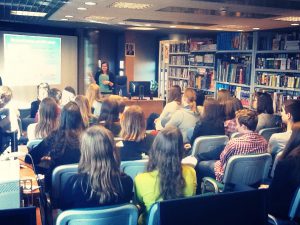
Dani Francuz Rose, 2015-2016, Fulbright English Teaching Assistant to Poland, presenting to a group of local high school students visiting the American Corner
My husband Tucker and I (both from Georgia State University) have now been in Poland for over three months. We are here as Fulbright English Teaching Assistants and are located in the city of Łódź, in central Poland. During our time here, I am responsible for teaching several classes in the English Philology department at the University of Łódź. In addition to teaching, I am also involved in a weekly conversation club at the American Corner in Łódź and have been able to visit several other schools in the area to give presentations about American culture and the English language. Through these programs and in our daily lives in Poland, we are continuously learning about the people, the culture, and the language of our host country. We also have the unique opportunity to see how people in Poland celebrate the holidays all throughout the year.
Thus far, we have been through several, major Polish holidays, such as All Saint’s Day (a time to remember and celebrate the lives of family members who have passed away) and Andrzejki (a gathering for friends, family, and fortune-telling). We have also shared our American customs for holidays like Thanksgiving as presentations, conversation topics at the American Corner, and in everyday conversations with our new colleagues and friends. However, Christmas is the first holiday that we have in common. And it is a big one.
We started seeing Christmas decorations in mid-November. There is no Thanksgiving here, so no one fights about when to start decorating! There are also a few extra days of Christmas-related celebrations, such as Mikołajki (or Saint Nickolas’ Day), which is associated with Santa and seems to be mainly celebrated with children in school. Next is Wigilia (or Christmas Eve), which is the main day of Polish celebrations. Most people work half-days on Christmas Eve, and celebrate with their families in the evening and for the next few days. There are many customs Polish families observe on this evening, but it really differs from family to family. For our Wigilia, we were invited by our friend Mateusz (who is also our Polish teacher) to his family’s house in Łask, a small town about 30 minutes outside Łódź, which allowed us to experience not only a Polish Christmas, but also Polish life outside the city. We sat down for a truly amazing homemade Polish meal. There are typically 12 dishes served for Wigilia, and they usually only appear on Polish tables once a year. We had mushroom soup, cabbage pierogies with mushroom sauce, carp, cod, Greek fish, herring in a milk broth with potatoes, barszcz, homemade wine, dried fruit compote, eggnog (our contribution, made by Tucker), ajerkoniak (Poland’s much stronger version of eggnog), sernik (cheesecake), szarlotka (apple pie), makowiec (poppy seed cake roll), and a very delicious cream/custard cake.
Christmas Day in Poland is similar to the day after Christmas in the United States: more food and more family! We headed over to my friend (and colleague) Weronika’s apartment for Christmas dinner. We had amazing conversations, played games in English and Polish and, of course, ate more than seems possible. For dinner we had mushroom soup, beetroot and herring, a variety of dips and sauces (many of which I forgot to ask the names of), bread with butter, and bigos (a sort of cabbage and meat stew). Everything, as is typical in Poland, was again homemade: even the cakes and pierniczki (gingerbread cookies) we had for dessert. Christmas is difficult time to be away from family, but our incredibly generous Polish friends made sure that we not only learned about how they celebrate the holidays, but that we felt like we were a part of them. Tucker and I are so thankful for the people we have met here in Poland, and we cannot wait for them to visit the United States in the future! Being so far away from home, especially during the holidays puts many things into a new perspective. For example, my time in Poland has shown me that “family” does not only include the people we are related to, but also the people who make us feel like we’re home. We have experienced the most remarkable hospitality, which is not at all reserved only for holidays, and have truly formed another family here. Sometimes we call it our “Fulbright family” and sometimes our “Polish family”, but either way, the people we have met and the memories we have shared will forever be a part of our lives.
To future Fulbrighters, I recommend welcoming and developing the relationships formed while abroad because I believe the people connect us to culture more than anything else.
This experience has taught me more than I could have ever imagined about Polish customs and traditions, which certainly have added to my understanding of Polish culture as a whole. Every event I’ve witnessed and every encounter I’ve had has been another moment for reflection. It’s been an incredible journey learning about the culture I’m in, while at the same time shedding new light and perspective onto my own culture. It’s evident that Poland and the United States differ in many ways; however, I think what I have enjoyed learning the most is how truly similar we all are, especially when it comes to family.

No Comments